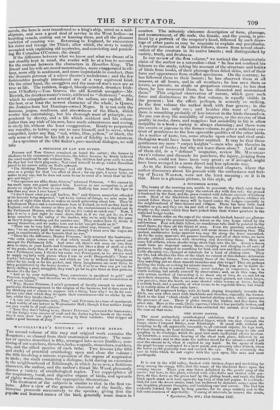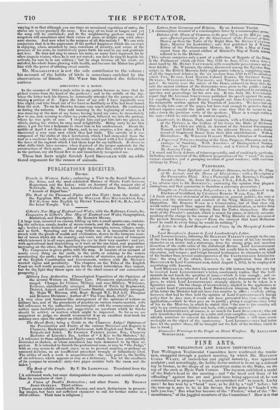MACGILIIVRAY ' S IIISTORY OF BRITISH BIRDS.
Tim second volume of this racy and original work contains the Songsters ; so classed from their anatomical structure. The mun- ber of species described is fifty, arranged into seven linnilies; con- sisting of ant-catchers, thrushes, larks, wagtails, stonechats, warblers, tits, and the allied species of each tribe. Two lessons (the fifth and sixth) of practical ornithology open and close the volume ; the fifth involving a minute exposition of the organs of respiration in birds ; the sixth containing a dialogue, held during an excursion in the neighbourhood. of Edinburgh, in which AcimioN, a fictitious character, the author, and the author's friend Mr. Wsue, pleasantly discuss a variety of ornithological topics. Two copperplates of the respiratory, vocal, and digestive organs of birds, and upwards of eighty wood-cuts, form the appropriate illustrations. The treatment of the subjects is similar to that in the first vo- lume. After a view of the generic character of the tinnily, the historian proceeds successively to the species; giving first the popular and learned names of the bird, generally sonic dozen in
number. The minutely elaborate description of form, plumage, and measurement, of the male, the female, and the young, is pre- faced by a portrait of the songster's head, followed by such draw- ings of other parts as may be requisite to explain any peculiarity. A popular account of its habits follows, drawn from actual obser- vation of the creature in its native haunts ; and distinguished by variety, truth, and freshness.
Iii our review of the first volume,* we noticed the characteristic claim of the author as a naturalist—that " he has not confined his labours to the study, taking his account of the structure and habits of birds from books, of their plumage from dried skins, and of their form and appearance from stuffed specimens. On the contrary, he has followed them to their haunts ; he has observed them at all seasons, at all hours, and in all weathers ; he has seen them as lovers, as parents, as single or gregarious creatures ; lie has shot them, he has measured them, he has dissected and anatomized them." This orWital observation of nature, which gave such force and distinctness to the first volume, is equally visible in the present ; but the effect, perhaps, is scarcely so striking. In the first volume the author dealt with four genera ; in the present he has only one ; and besides this want of variety, there is something probably of less interest in the birds themselves. No one can deny the amiability of songsters, or the reverse of that quality in rooks, daws, and magpies: but amiability in life is often insipidity in a book ; variety is always charming ; and there were the cooers or pigeons in the former volume, to give a sufficient con- trast of gentleness to the less agreeable qualities of the other birds. As a matter of taste, too, sonic attacks upon other and rival orni- thologists would have been better omitted. It may be that those gentlemen are mere " carpet knights "—men who spin theories in closets out of books ; but why not leave them alone ? And if one of them did, in a " defunct" magazine, review Mr. M.icumm- 'MAY'S volume and dissuade its purchase, the injury, judging from the death, could not have been very great ; or if avenged, might have been avenged in a more direct and less splenetic way.
As in the former volume, the incidental chapters, where the author discourses about his pursuit with the enthusiasm and feel- ing of IzAAg. WALTON, were not the least amusing ; so it is in this. Here is a pleasant picture, in this style, of
A NOVEMBER SCENE.
The beams of the morning sun, unable to penetrate the thick mist that is spread over the ocean, merely tinge the eastern sky with dim red ; the ground is hardened by the frost, and the grass erusted with delicate crystals of feathery snow. Most of the blackbirds and thrushes are in the gardens, whither we cannot follow them ; but many will be found under the hedges, especially in the neighbourhood of farm-houses and villages. There has 'been little hard weather as yet, and they are fat and full of sap, for they have feasted luxu- riously on the snails which they have jerked from their winter quarter's in the walls and hedge-banks. There stands robin on the cope of the stone-wall, Iris dark humid eye glisten- ing as he surveys the ground beneath, intent on the tiny heaps raised by the earthworms. Fear not, little fellow, no murderous tube shall be pointed to thy small frame, for thou art the friend of man. Even the prowling school-boy, armed though he be with an old pistol, will never dream of harming thee. The modest, unobtrusive hedge-sparrow too, may flit along the fence unscathed. As for the noisy sparrows, the pensive buntings, and all of their tribe, we have already satisfied ourselves with observing and describing them. Here are some tall willows, whose slender twigs shoot high into the air. About a dozen small birds are dispersed among them, creeping and clinging in all sorts of postures, busily engaged in searching for food, and now and then emitting their feeble cheeping, cry, changed at intervals for a kind of chiding chin. They are tits, but whether the Mue or the black we cannot at this distance determine by sight, although the. notes are certainly those of the former. Now, what are they searching out on those smooth branches and slim twigs? They are perhaps picking the buds, or seeking for minute insects. When you are in doubt re- specting any thing inn natural history, never indulge in conjecture, for it is worth nothing, but satisfy yourself by observation ; and, as in this case, the only certain method of succeeding is to shoot one or two, do 83, and let us open their stomachs. The contents of this very small gizzard, not much larger, you perceive, than the heart, are some slender white worms, or larva!, having a reddish head, and is quantity of what seems to be vegetable fibres, but which is in reality skins of these same larva?.
In that tall unpruned hedge, with its hank sloping irregularly towards the ditch, one may often meet with blackbirds and thrushes, especially the former. Hark to the loud "chink chink," and hurried chiding notes, which announce the presence of one. There it glides among the bushes, and flies down the other side. here is the snail, (helix a spersa,) which it has partially broken, and here a heap of others, from which it has extracted the annual, after breaking the case on that stone.
THE DYING DOPER.
The most melancholy ornithological exhibition that I remember to • have witnessed, was that of is wounded dipper, which was shot through the lungs, above Cramond Bridge, near Edinburgh. It stood still, without at- tempting to fly off, apparently insensible to all external objects, its legs bent, it wings drooping, its head declined. The blood was oozing from its side and gurgling in its windpipe, which the poor bird made ineffectual efforts to clear. At intervals, a convulsive heaving of the chest took place, followed by an effort to vomit ; and in this state the sufferer stood for five minutes. until I got over the stream to it, when it expired in my hand. In the agony of death the pupil became contracted to a mere point, and presently after dilated, when the lower eyelid ■•rirditally rose and covered the eye. This is commonly the case in birds which do riot expire with the eyes open, like man and most quadrupeds.
THE BLACKBIRD'S SONG.
It is not in the wild valley, flanked with birchen slopes and stretching far away among the craggy hills, that the music of the blackbird floats upon the evening breeze. There you may listen delighted to the gentle song of the mavis ; but here, in this plain, covered with corn-fields and skirted with gar- dens, sit thee down on the green turf by the gliding brook, anti-mark the little black speck stuck acv it were upon the top twig of that tall poplar. It is ablitek- bird, fur now the sweet strain, loud, but mellowed by distance, comes upon the car, inspiring pleasant thoughts, and banishing care and sorrow. The bird has evidently learned his part by long practice, for he sings sedately and in the full consciousness of superiority. Ceasing at intervals, he renews the strain, * Spectator, No. 486 ; 21st October 1837. varying it so that although you can trace an occasional repetition of notes, the staves are never precisely the same. You may sit an hour or longer, and yet the song will be continued; and in the neighbouring gardens many rival songsters will sometimes raise their voices at once, or delight you with alter- nate strains. And now what is the purpose of all this melody ? We can only conjecture that it is the expression of the perfect happiness which the creature is enjoying, when, uncorked by care, conscious of security, and aware of the presence of his mate, ho instinctively pours forth his soul in joy and gratitude and love. He does not sing to amuse his mate, as many have supposed, fin' he often sings in winter, when heis not yet mated ; nor does he sing to beguile his solitude, for now he is not solitary ; but he sings because all his wants are satisfied, his whole frame glowing with health, and because his Maker has gifted him with the power of uttering sweet sounds.
Mr. MACGILLIVRAY is not the sole contributor to the volume ; his account of the habits of birds is sonic:0 .mes enriched by the observations of friends. Mr. WEIR has furnished the following curious
ANECDOTES 01' A ROBIN.
In the summer of 1833 a male robin in my garden because so tame that he picked worms from the hand of the gardener ; and in the middle of the day, when the latter took his dinner, he constantly attended for the purpose of ob- taining & portion of it. Upon the knee of my wife 1 have repeatedly seen him alight, and take bread out of her hand as familiarly as if' he had been tamed from the nest. To me he likewise became very much attached. He continued so during the autumn. One cold morning in the beginning of winter, as 1 was standng at the door of my house, having heard my voice, lie immediately ,fiew to me, and, accusing to claim my protection, followed use into the parlour, where he was quite at case. I caught him end put him into my garret, in which, during the winter, he sang most delightfully. Being sorry to see him alone, I got for him a helpmate to cheer him in his confinement. About the middle of April 1 set them at liberty, and, to my surprise, a few days after I discovered a very neat nest which they had built. The outside of it was composed of the stalks of dried horehound, which I had suspended from the roof as a medicine for the cold, and the inside was lined with a few feathers and the down of the ragwort which I had there kept for my bullfinch. It shows to what shills birds have recourse when deprived of the proper materials for the construction of their nests. About eight days after this, whilst I was sitting in the parlour, my old friend flew in and immediately recognized me.
These last facts might furnish Lord BROUGHAM with an addi- tional argument for the reason of' animals.



























 Previous page
Previous page